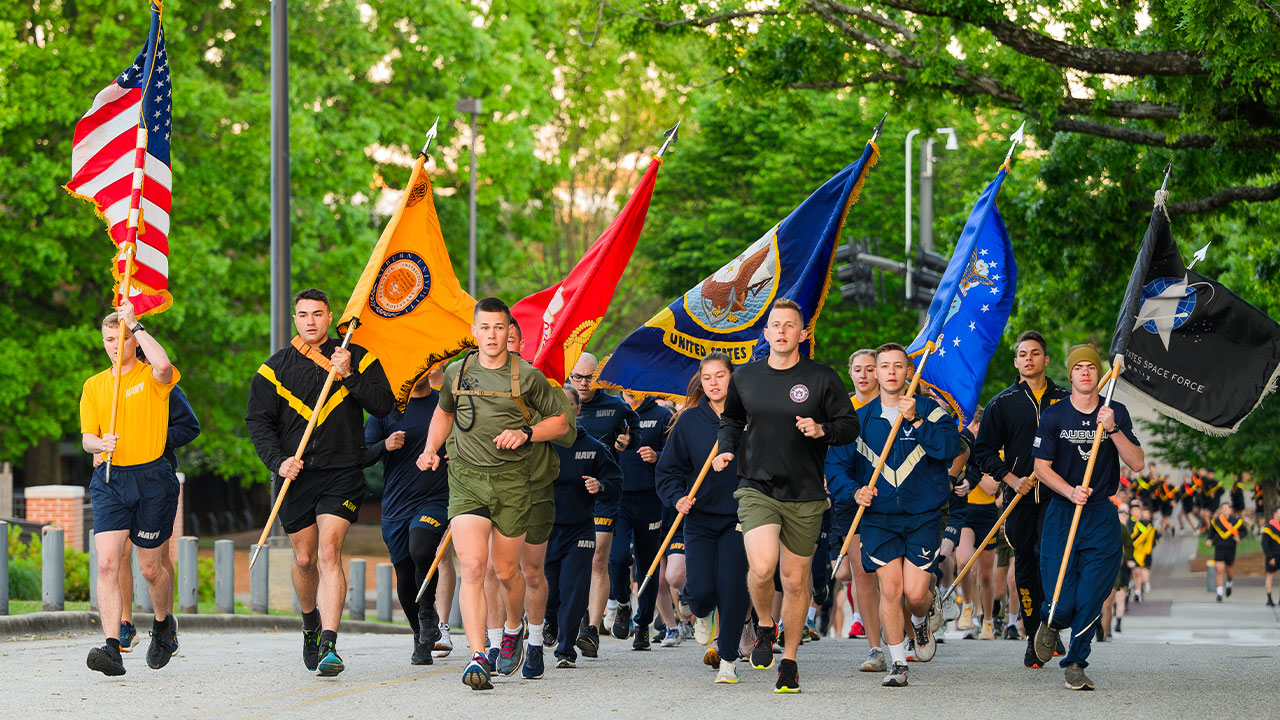content body
From its early years to today’s research benefiting service men and women, Auburn University remains a strong supporter of our nation’s military.
When it was known as East Alabama Male College, Auburn taught military tactics, and students wore grey woolen-uniforms and marched to class in companies. These days, the uniform-clad students undergoing military training are part of one of the three Reserve Officer Training Corps (ROTC) programs.
For those students who already served their country, the Veterans Resource Center can help them navigate the return to civilian life and complete their college education. Because of the work of VRC staff and others, Auburn has consistently earned the Military Friendly® School designation from G.I. Jobs magazine.

Admiral Christopher Grady, vice chairman of the Joint Chiefs of Staff, recently visited the Samuel Ginn College of Engineering, including its National Center for Additive Manufacturing Excellence, because of Auburn’s work with the U.S. military.
Equipment support
The Samuel Ginn College of Engineering collaborates with the military in a number of research areas. In January, the university announced the largest research contract in its history was awarded to the college to help the U.S. Army Combat Capabilities Development Command Aviation and Missile Center boost its increasing modernization efforts with advanced manufacturing.
The project will be facilitated through the Auburn University Applied Research Institute in Huntsville and rely extensively on research expertise in Auburn’s National Center for Additive Manufacturing Excellence and the Interdisciplinary Center for Advanced Manufacturing Systems.
Steve Taylor, senior vice president for research and economic development, called it a “significant accomplishment for Auburn’s research enterprise,” placing value on the university’s Army partners in Huntsville and beyond, as well as Auburn’s work in advanced manufacturing.
In 2022, Auburn and the Army signed a 10-year, renewable Intergovernmental Support Agreement for the university to provide natural resource management services to eight Army bases across the Southeast. The agreement has since expanded to include 27 Army installations in the Eastern region and environmental, cultural, architecture and engineering services.
The partnership led to the establishment of the Center for Natural Resource Management on Military Lands in Auburn’s College of Forestry, Wildlife and Environment.

Warrior support
JoEllen Sefton, a professor in the School of Kinesiology and director of Auburn’s Warrior Research Center in the College of Education, has been researching military populations since 2008. Her recent work involves developing a comprehensive performance initiative for military service members attending Air University at Maxwell Air Force Base in Montgomery, Alabama.
“One reason the Air Force came to us is because the Warrior Research Center reaches out across Auburn to collaborate with partners that can help us provide any additional expertise that’s needed,” she said.
The initiative, named BOLT for the lightning bolts on the Air University shield, is designed to focus on the Air Force’s Comprehensive Airman Fitness pillars: physical, social, spiritual and mental. The program’s first participants are the 500 military service members currently teaching and studying at Air University’s Air Command and Staff College.
Engineering also has an educational partnership with Air University, as well as Robins Air Force Base in Warner Robins, Georgia, that allow engineering faculty and students to participate in Air Force-related research and technology.

Family support
The work of two faculty members with the Department of Human Development and Family Science in the College of Human Sciences support the military and their families.
Professor Mallory Lucier-Greer uses Military REACH to bridge the gap between military family research and practice by making research practical and accessible to the U.S. Department of Defense (DOD) and others who work on behalf of military families.
“Family readiness is an essential component of operational readiness, such that service members with healthy, prepared families are better prepared to focus on their mission,” she said. “Part of my job is identifying resources, supports and programs that enhance family readiness.”
Associate Professor Kyle Kostelecky also has a longstanding partnership with the DOD to meet the professional development needs of those who serve military families worldwide through OneOp. It is “a virtual organization with global reach,” offering free, online learning opportunities to the DOD, Cooperative Extension System, community non- and for-profit organizations and others.
Both projects receive funding through a partnership between DOD’s Office of Military Community and Family Policy and the U.S. Department of Agriculture/National Institute of Food and Agriculture.




